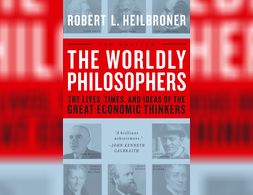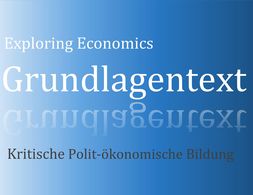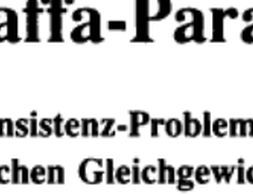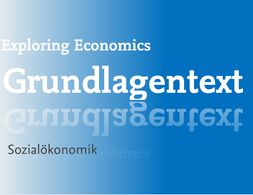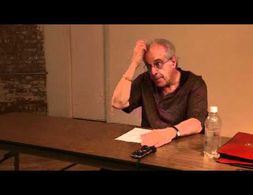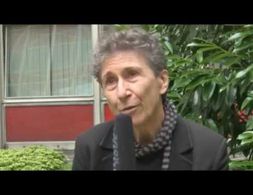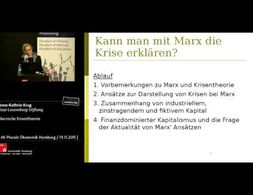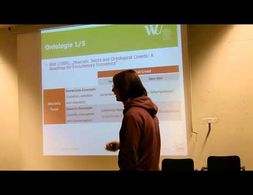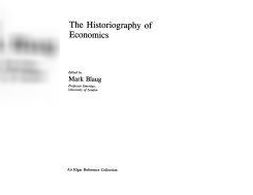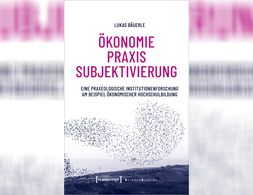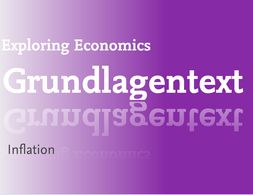232 Ergebnisse
Führen Marxismus und Feminismus eine unglückliche Ehe? In diesem Radiointerview erläutert Frigga Haug die Beziehung von marxistischer und feministischer Theorie, insbesondere im Kontext der Studierendenbewegung und der Hausarbeitsdebatte in den 1970er Jahren. Dabei geht sie auf das Spannungsverhältnis der Frauenbewegung und der Arbeiterbewegung ein. In dem Interview wird zudem die aktuelle Relevanz der Marx'schen Krisentheorie diskutiert und erfragt, ob es neue Rezeptionen von Marx aus feministischer Perspektive gibt. Frigga Haug stellt in dem Interview auch die von ihr entwickelten Vier-in-Einem Perspektive vor.
The bestselling classic that examines the history of economic thought from Adam Smith to Karl Marx—“all the economic lore most general readers conceivably could want to know, served up with a flourish” (The New York Times). The Worldly Philosophers not only enables us to see more deeply into our history but helps us better understand our own times. In this seventh edition, Robert L. Heilbroner provides a new theme that connects thinkers as diverse as Adam Smith and Karl Marx.
Marx’s theory of the falling rate of profit is not only empirically borne out, but the theory he proposed seems to describe accurately how that happens. Furthermore, the whole process is useful for understanding the history of contemporary capitalism.
This edited volume presents a collection of articles that engage with various concepts from Marx’s Capital and Marxian theory in general, from a ‘Southern’ perspective. The book engages with four specific themes: “Reception of Capital in the East; Value, Commodity, Surplus Value and Capitalism; Population and Rent in Capital; and Issues Beyond Capital”.
The workshop introduces into the field of critical political economy and tries to identify the role of finacial markets in capitalism, the reason for financial crises and the relevance of Marx in regard to these topics.
Adam Smith and Karl Marx recognized that the best way to understand the economy is to study the most advanced practice of production. Today that practice is no longer conventional manufacturing: it is the radically innovative vanguard known as the knowledge economy.
Der Beitrag skizziert kritische polit-ökonomische Bildung als eine umfassende herrschaftskritische Praxis mit dem Ziel der Aufhebung der gegenwärtigen Form gesellschaftlicher Reproduktion.
This Companion takes stock of the trajectory, achievements, shortcomings and prospects of Marxist political economy. It reflects the contributors' shared commitment to bringing the methods, theories and concepts of Marx himself to bear across a wide range of topics and perspectives, and it provides a testimony to the continuing purpose and vitality of Marxist political economy.
Introduces four of the most influential economists you'll never read in a modern economics class - Marx, Veblen, Keynes, and Galbraith.
Das Buch vergleicht die neoklassische Gleichgewichtstheorie in der Formulierung Piero Sraffas mit der von Karl Marx und zeigt auf, dass beide ein gemeinsames Problem der Konsistenz teilen.
Die Sozialökonomik ist 1. die historische Fachbezeichnung einer integrierten Sozial- und Wirtschaftswissenschaft (vgl. Einzelwissenschaft, Disziplin) und 2. ein kontextabhängiger Ausdruck für komplexe Zusammenhänge von Gesellschaft und Wirtschaft (vgl. Sozialökonomie bzw. Sozioökonomie).
Capitalism cannot fulfil the promises of the French revolution: Liberty, Equality, Fraternity. Why? Richard Wollf elaborates on Marx's analysis of the distribution and organisation of surplus in society and his conclusion that there is something inherently wrong in capitalist class structure that still causes economic crisis in our modern times. Change requires changing the organisation of the production. This goes far beyond a discussion of 'more-state' vs. 'less-state'.
Silvia Federici illustrates the potential of the concept of the commons as way of resistance and reorganization of the society in times of social injustice and ecological crisis. Amongst others, she outlines the role of women in the commons movement.
Federici explains why she regards the theory of the tragedy of the commons as unfounded and why she considers Marx's concept of primitive accumulation as still appropriate to describe current events of deprivation, such as land grabbing.
Anne-Kathrin Krug gibt eine Einführung in die marxistische Analyse der kapitalistischen Produktion und erläutert dabei Begriffe wie Arbeit, Ware oder Wert. Anschließend erläutert sie Marx Krisenzyklustheorie. Dabei stellt sie den Fall der Profitrate als mögliche Erklärung von Krisen dar, zeigt aber auch, dass es gegenläufige Tendenzen gibt. Weiter Themen des Vortrages sind Unterkonsumption und Möglichkeiten von Krisen (Produktions-, Handelskrisen und Geldkrisen).
Zunächst erläutert Manuel Wäckerle die Grundzüge der der Evolutionsökonomik und präsentiert eine kurze Ideengeschichte der Theorieschule, wobei er insbesondere auf Ansätze von Marx, Schumpeter und Veblen Bezug nimmt. Wäckerle hebt die Rolle von Institutionen in der Evolutionsökonomik hervor, erläutert unterschiedliche Verständnisse von Institutionen und geht dabei auf Gouvernementalität, soziales Lernen, Wissen und Macht ein. Darauf folgt eine wissenschaftstheoretische Annäherung, insbesondere an die Ontologie der Evolutionsökonomik und deren Hauptobjekt der Analyse.
Most mainstream neoclassical economists completely failed to anticipate the crisis which broke in 2007 and 2008. There is however a long tradition of economic analysis which emphasises how growth in a capitalist economy leads to an accumulation of tensions and results in periodic crises. This paper first reviews the work of Karl Marx who was one of the first writers to incorporate an analysis of periodic crisis in his analysis of capitalist accumulation. The paper then considers the approach of various subsequent Marxian writers, most of whom locate periodic cyclical crises within the framework of longer-term phases of capitalist development, the most recent of which is generally seen as having begun in the 1980s. The paper also looks at the analyses of Thorstein Veblen and Wesley Claire Mitchell, two US institutionalist economists who stressed the role of finance and its contribution to generating periodic crises, and the Italian Circuitist writers who stress the problematic challenge of ensuring that bank advances to productive enterprises can successfully be repaid.
This paper presents an overview of different models which explain financial crises, with the aim of understanding economic developments during and possibly after the Great Recession. In the first part approaches based on efficient markets and rational expectations hypotheses are analyzed, which however do not give any explanation for the occurrence of financial crises and thus cannot suggest any remedies for the present situation. A broad range of theoretical approaches analyzing financial crises from a medium term perspective is then discussed. Within this group we focused on the insights of Marx, Schumpeter, Wicksell, Hayek, Fisher, Keynes, Minsky, and Kindleberger. Subsequently the contributions of the Regulation School, the approach of Social Structures of Accumulation and Post-Keynesian approach, which focus on long-term developments and regime shifts in capitalist development, are presented. International approaches to finance and financial crises are integrated into the analyses. We address the issue of relevance of all these theories for the present crisis and draw some policy implications. The paper has the aim to find out to which extent the different approaches are able to explain the Great Recession, what visions they develop about future development of capitalism and to which extent these different approaches can be synthesized.
This paper attempts to clarify how the European economic crisis from 2007 onwards can be understood from the perspective of a Marxian monetary theory of value that emphasizes intrinsic, structural flaws regarding capitalist reproduction. Chapter two provides an empirical description of the European economic crisis, which to some extent already reflects the structural theoretical framework presented in chapter three. Regarding the theoretical framework Michael Heinrich's interpretation of 'the' Marxian monetary theory of value will be presented. Heinrich identifies connections between production and realization, between profit and interest rate as well as between industrial and fictitious capital, which represent contradictory tendencies for which capitalism does not have simple balancing processes. In the context of a discussion of 'structural logical aspects' of Marx's Critique of the Political Economy, explanatory deficits of Heinrich's approach are analyzed. In the following, it is argued that Fred Moseley's view of these 'structural logical aspects' allows empirical 'applications' of Marxian monetary theories of value. It is concluded that a Marxian monetary theory of value, with the characteristics of expansive capital accumulation and its limitations, facilitates a structural analysis of the European economic crisis from 2007 onwards. In this line of argument, expansive production patterns are expressed, among other things, in global restructuring processes, while consumption limitations are mitigated by expansive financial markets and shifts in ex-port destinations.
This lecture briefly discusses historic understandings of the limits to infinite economic growth on a finite planet (from John Stuart Mill to Marx). Taking a ecological economics perspective it discusses the metabolism of the economy, the economy as a subsystem of the environment, biophysical limits to growth, and sustainable economic scales.
This course introduces students to political economy and the history of economic thought. We will cover the core ideas in various schools of economic thought, positioning them in the historical and institutional context in which they were developed. In particular, we will cover some economic ideas from the ancient world and the middle ages; the enlightenment; the emergence of and main ideas in classical political economy (Adam Smith, David Ricardo, Thomas Malthus, and others); Marx, Mill, and Keynes; European versus American economic thought through history; the rise of mathematical economics; economic theories around state-managed economies versus socialism; Austrian economics; behavioral economics; and the future of economics.
This volume focuses on the importance of the history of economic thought as an intellectual discipline. It counters the arguments of some contemporary economists who describe it as studying the mistakes of the past. However, all the great economists - Smith, Ricardo, Marx, Marshall, Keynes and even Milton Friedman - have drawn on the history of economics to find an appropriate pedigree for their own theoretical innovations.
Umfassende Analysen des globalen Kapitalismus haben wieder Konjunktur, und mit ihnen kommt auch der zwischenzeitlich totgesagte Karl Marx wieder zu unverhofften Ehren (Negri/Hardt, Robert Kurz u.A.). FReilich scheint diese Auseinandersetzung durchweg recht oberflachlich, findet zumindest Michael Heinrich und pladiert somit fur eine Neuaneignung der Marxschen Theorie selbst.
Das Leiden an der Liebe ist ein soziologisches Phänomen, das Illouz untersucht wie einst Marx die Ware im Kapitalismus: in Begriffen des Tauschs zwischen ungleichen Marktteilnehmern. In sechs Kapiteln entfaltet sie die Ursachen zeitgenössischen Liebesleidens sowie die Spezifika des heutigen Umgangs mit Beziehungskrisen. Die digitalen Heiratsmärkte spielen dabei ebenso eine Rolle wie die neuen Mechanismen der Partnerwahl und der strategische Umgang mit der romantischen Vorstellungskraft.
This book discloses the economic foundations of European fiscal and monetary policies by introducing readers to an array of alternative approaches in economics. It presents various heterodox theories put forward by classical economists, Marx, Sraffa and Keynes, as a coherent challenge to neoclassical theory.
Wie sähen Wirtschaftswissenschaften aus, die sich konsequent den Praktiken wirtschaftender Akteur*innen zuwenden? Um diese Frage zu beantworten, entwickelt Lukas Bäuerle einen konzeptuellen Rahmen aus Institutionen- und Praxistheorien, kritischem Realismus und Sozialphänomenologie, den er stringent zu einer praxeologischen Institutionenforschung zuspitzt. Am Beispiel der Subjektivierungspraktiken von Studierenden der Wirtschaftswissenschaften dekliniert er seinen Ansatz durch und deutet die empirischen Ergebnisse in Anlehnung an Friedrich Hayek, Karl Marx und Roberto Unger. Das Ergebnis: Wirtschaftswissenschaften sollten nicht nur grundlegend neu gemacht werden, sondern können es auch!
The last 15 years have seen extensive research into ecosystem service valuation (ESV), spurred by the Millenium Ecosystem Assessment in 2005 (Baveye, Baveye & Gowdy, 2016). Ecosystem services are defined as “the benefits people obtain from ecosystems” (Millenium Ecosystem Assessment, p.V). For example, ecosystems provide the service of sequestering carbon which helps regulate the climate. Valuation means giving ecosystems or their services a monetary price, for example researchers have estimated that the carbon sequestration services of the Mediterranean Sea is between 100 and 1500 million euros per year. The idea of ESV was a response to the overuse of natural resources and degradation of ecosystems, allegedly due to their undervaluation and exclusion from the monetary economy. ESV can be used (1) for policy decision-making, for example allocating funding to a reforestation project (2) for setting payments to people who increase ecosystem services, for example a farmer increasing the organic carbon content of their soil, and (3) for determining fees for people who degrade ecosystem services, for example a company that causes deforestation.
Marxian Political Economy focuses on the exploitation of labour by capital. The economy is not conceived as consisting of neutral transactions for exchange and cooperation, but instead as having developed historically out of asymmetric distributions of power, ideology and social conflicts.
Der Fokus der Marxistischen Politischen Ökonomik liegt auf der Ausbeutung von Arbeit durch Kapital. Die Ökonomie wird nicht als neutrale Austausch- und Kooperationsplattform gesehen, sondern als historische und politische Ausprägung, die von asymmetrischen Machtverhältnissen, Ideologie und sozialen Konflikten geprägt ist.
The concept of financialisation has undergone a similar career as ‘globalisation’, ‘neoliberalism’ or even ‘capitalism’, in the course of which it changed from the explanandum to the explanans; the process of financialisation is taken for granted, while the concrete historical and empirical causal conditions of its realisation and perpetuation are being moved into the background.
The module is designed to first present some of the main schools of thought from a historical and methodological perspective. Each week we explore and critically assess the main tenants of each school of thought. In the second part of the module we link history of economic thought and methodology to a specific and contemporary economic question. The second part allows you to engage with current economic issues with an awareness of methodology and methodological differences and with some knowledge of the history of economics.
Was ist Inflation? Warum ist sie relevant? Und gibt es eine einheitliche Theorie über ihre Wurzeln und Ursachen, oder ist sie ein umstrittenes Konzept? Genau darum geht es in diesem Text: Wir definieren, was Inflation eigentlich bedeutet, bevor wir uns mit einem interdisziplinären und pluralistischen Ansatz in die theoretische Debatte stürzen: Wie entsteht sie, welche Faktoren können sie beeinflussen, und was kann man dagegen tun?
Manuel Schulz hat sich im Rahmen der Schreibwerkstatt "Varieties of Mainstream Economics?" kritisch mit dem normativen Selbstverständnis der Verhaltensökonomik auseinandergesetzt.
Wir nutzen Cookies. Klicke auf "Akzeptieren" um uns dabei zu helfen, Exploring Economics immer besser zu machen!


